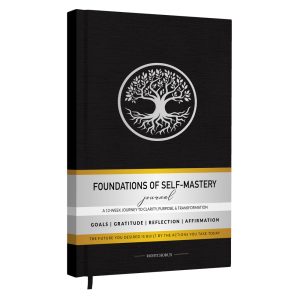Daily journaling is a timeless practice proven to enhance mindfulness, productivity, and self-awareness.
But when approached with deeper purpose, a growth journal offers something even greater: a structured path to confidence, clarity, and personal transformation.
By reflecting intentionally, we unlock insights that lead to real change. This blog explores why a growth journal isn’t just a notebook—it’s a coaching tool for the soul.
You’ll learn how daily reflection supports resilience, clarity, and emotional balance, and how to make journaling feel effortless.
If you’re looking for a supportive guide to begin or enrich your journey, explore the thoughtfully designed Foundations of Self Discovery Mastery Journal—a tool created to help you uncover your inner truth with daily prompts and reflective rituals.
Foundations of Self Discovery & Mastery Journal: A 13-Week Personal Development Journal System
$29.95
The Foundations of Self Discovery…
Table of Contents
What Is a Growth Journal and Why It Matters
Not all journals are created equal. A growth journal is intentionally designed to foster emotional clarity, personal accountability, and authentic self-discovery.
While a blank notebook invites expression, a guided growth journal gives your thoughts structure—creating a safe and steady framework to explore challenges, celebrate wins, and reflect on patterns over time.
Using a growth journal can help declutter your internal world by identifying what matters most.
Instead of spiraling in self-doubt or reacting from emotion alone, structured journaling shows you the full picture.
From daily stressors to life’s big crossroads, this practice separates the noise from the message—promoting mental calm and behavioral insight.
The Foundations of Self Discovery Mastery Journal is a standout solution.
With six daily prompts—Today’s Goal, Today’s Affirmation, Gratitude, What Went Well, What to Improve, and Tomorrow’s Next Step—it brings a rhythm to your reflection.
Its 13-week format helps users build a meaningful habit while exploring layered themes of growth, purpose, and peace.
Structured Reflection Fosters Inner Change
An ordinary notebook may capture ideas, but it often lacks accountability. Structured writing holds us steady and focused.
Growth journaling aligns intention with action by using consistent, evidence-based prompts like:
- Morning affirmations that prime your mindset
- Evening reflections that anchor your emotional check-ins
- Open-ended questions that challenge limiting beliefs
- Progress tracking to connect daily decisions with long-term milestones
These patterns initiate behavioral change through cognitive strategies like retrieval, reappraisal, and visualization—practices behind lasting personal growth.
How Clarity Grows from Deep Personal Insight
When we put pen to paper mindfully, we start to connect our choices with our emotional state. Anger, avoidance, overthinking—they begin to show up not as flaws but as signals.
A growth journal highlights the circumstances beneath our challenges so we can respond rather than react.
This process helps:
- Identify emotional triggers through repeated reflections
- Track cycles of stress, rest, overwhelm, or motivation
- Discover core themes (like perfectionism, scarcity, or belonging)
- Realign values and self-talk across various life domains
A guided journal doesn’t replace therapy, but it amplifies self-awareness and resilience when used consistently.
Foundations of Self Discovery & Mastery Journal: A 13-Week Personal Development Journal System
$29.95
The Foundations of Self Discovery…
Daily Self-Reflection as the Foundation of a Growth Journal

Daily self-reflection provides the bedrock of any effective growth journaling practice. It’s not the length of time you write, but the consistency and intent that reshapes thought patterns and behavioral responses.
Over time, regular journaling rewires your neural pathways—creating space between stimulus and response.
The benefits of daily journaling extend beyond general mindfulness. It can significantly:
- Improve emotional regulation and stress tolerance
- Unlock creative problem-solving abilities
- Reduce mental clutter and executive fatigue
- Strengthen identity through pattern recognition
Establishing daily rituals turns journaling into a supportive, fulfilling act of self-connection, not another task to cross off.
Here are two ways to bring ease and sustainability into your daily writing habit.
Why Daily Reflection Creates Long-Term Change
Our brains reinforce what we repeat. Neuroscience shows that journaling daily helps increase neuroplasticity—the brain’s capacity to evolve through repeated behavior.
When we journal consistently, we build new habits and reframe outdated stories.
Daily self-reflection supports:
- Mental agility by slowing rumination
- Improved self-monitoring and impulse control
- Resilient responses to triggers or setbacks
- Sustainable behavior change through small wins
The design of the Foundations of Self Discovery Mastery Journal supports this beautifully. Its six-part framework makes it simple to engage each day in just 5–10 purposeful minutes.
With sections to review past progress and preview future goals, it reinforces the spiral of growth.
How to Create a Mindful Journaling Ritual
To transform journaling into a self-nurturing ritual, make it a sensory experience. Choose a consistent time and space that encourages ease.
Whether it’s sunrise gratitude or bedtime closure, environmental cues anchor your habit.
Try this:
- Light a calming candle or diffuse essential oils
- Set a 10-minute timer and put your phone on silent
- Keep your journal in a dedicated drawer, bedside, or bag
- Add a gentle entry cue—a special pen, mug of tea, or playlist
By linking your journaling with pleasure and calm, it becomes a meaningful act of renewal.
Foundations of Self Discovery & Mastery Journal: A 13-Week Personal Development Journal System
$29.95
The Foundations of Self Discovery…
Tracking Emotional Patterns in Your Growth Journal
Becoming emotionally literate means noticing what you feel and understanding why.
Growth journaling is one of the most powerful ways to track your emotional cycles and bring unconscious reactions into conscious awareness.
Over time, this allows you to make empowered decisions rooted in understanding, not reflex.
Recognizing your emotional patterns requires consistent check-ins and thoughtful review. With strategic journaling, you begin to:
- See which events repeatedly disrupt your calm
- Notice mood patterns linked to people, work, or seasons
- Decode the emotional charge behind specific triggers
- Reduce emotional reactivity through better emotional intelligence
Here’s how to use your journal as a diagnostic and healing tool.
How to Recognize Reoccurring Emotional Themes
Do you find yourself reacting the same way in similar circumstances? Journaling can help you identify these hidden loops.
Mood-mapping or trigger-tracking entries allow you to observe your reactions without judgment.
Use your growth journal to:
- List moments of emotional intensity and rate their intensity
- Describe the situation: who was involved, what was said
- Connect the moment to an earlier memory or belief
- Track these notes over time and highlight recurring themes
Once patterns emerge, you’re better equipped to choose a different response—or gently reparent the part of you that was triggered.
Learning to Navigate Emotional Triggers
An emotionally sensitive day isn’t a failure—it’s feedback. Record conflicts, criticisms, or perceived slights, and unpack them safely on the page.
This builds psychological strength and supports emotional regulation.
Try questions like:
- What was I needing when this emotion surfaced?
- What story did I attach to this situation?
- What would compassion sound like in this moment?
- How can I move forward with clarity or boundaries?
The act of naming and understanding your experience rewires your threat system toward calm and connection.
Foundations of Self Discovery & Mastery Journal: A 13-Week Personal Development Journal System
$29.95
The Foundations of Self Discovery…
Uncovering Core Values Through a Growth Journal Practice

Understanding your core values is essential for authentic living. A growth journal helps you clarify what truly matters—and gives you a place to realign your daily actions accordingly.
When we live in harmony with our values, we feel centered, purposeful, and self-respecting.
Journals that integrate value-oriented prompts shift your focus from external approval to internal alignment.
They remind you to:
- Reflect on current priorities versus ideal priorities
- Explore internal dissonance that signals misalignment
- Identify goals that feel energizing, not just productive
- Commit to decisions rooted in your deeper truth
When you’re ready to ground in your truth, the Foundations of Self Discovery Mastery Journal offers daily guidance.
Each quote, question, and affirmation is selected to inspire internal clarity and purposeful expansion.
How Journaling Can Help You Define Life Values
Ask “why” five times. This deceptively simple technique often reveals the motivations and fears behind our surface-level goals. When we go deeper, our core values start to shine through.
In your journal:
- Write down a goal you want to achieve (e.g., make more money)
- Ask “why?” and write the answer
- Do this four more times to get to the root motivation
- Analyze what this reveals—often it’s about safety, legacy, or impact
Another method is value sorting: rank traits like honesty, creativity, freedom, growth, connection. Prompt yourself: “Which would I choose if I could only keep five?”
Aligning Daily Habits with Your Values
Once you uncover your core values, examine your day-to-day habits. Are they helping you live out your values—or pulling you out of alignment?
Try daily prompts like:
- How did I live by my values today?
- Which activity felt energizing/draining, and why?
- Where am I saying “yes” when I mean “no”? To what end?
- What tiny habit would honor my value of ___ tomorrow?
Journaling around alignment builds integrity, energy, and long-term clarity.
Frequently Asked Questions
A growth journal is a guided, intentional journaling practice designed to help you reflect on emotions, habits, mindset, and goals. Unlike a regular blank notebook, a growth journal uses structured prompts to support transformation, personal alignment, and lasting change.
Aim for consistency without pressure. Even 5–10 minutes daily or several times a week creates momentum. The Foundations of Self Discovery Mastery Journal makes it easy to stay on track with daily prompts and rituals.
Try: “What emotion am I feeling right now and why?”, “What patterns do I notice this week?”, “What would the wisest version of me say right now?”, or “What do I want more or less of in my life?”
Yes. Writing helps externalize racing thoughts, reducing intensity and emotional charge. It also supports reframing and self-regulation. Journaling can be especially helpful for recognizing cognitive distortions and shifting into more empowered perspectives.
We recommend the Foundations of Self Discovery Mastery Journal. It’s intentionally designed with a structured yet flexible system that guides you toward self-awareness, clarity, and emotional strength.
Flexibility is key! Many people enjoy starting with structured prompts, then move toward more intuitive writing. The Foundations of Self Discovery Mastery Journal supports both with blank pages and guided sections.
Absolutely. Journaling nurtures creative breakthroughs and helps process emotions that inspire meaningful art. Visual journaling or emotional metaphor writing also allows for expressive, healing creativity.
Yes. During transitions like job changes, breakups, or grief, journaling is a powerful way to process uncertainty, track emotional shifts, and gently reframe your narrative in ways that encourage healing and direction.
No. As long as you’re being honest and consistent, you’re doing it right. The goal isn’t perfection—it’s progress, reflection, and connection with yourself.
Use guided tools. The Foundations of Self Discovery Mastery Journal includes daily prompts and example entries to get you started with confidence and structure.







